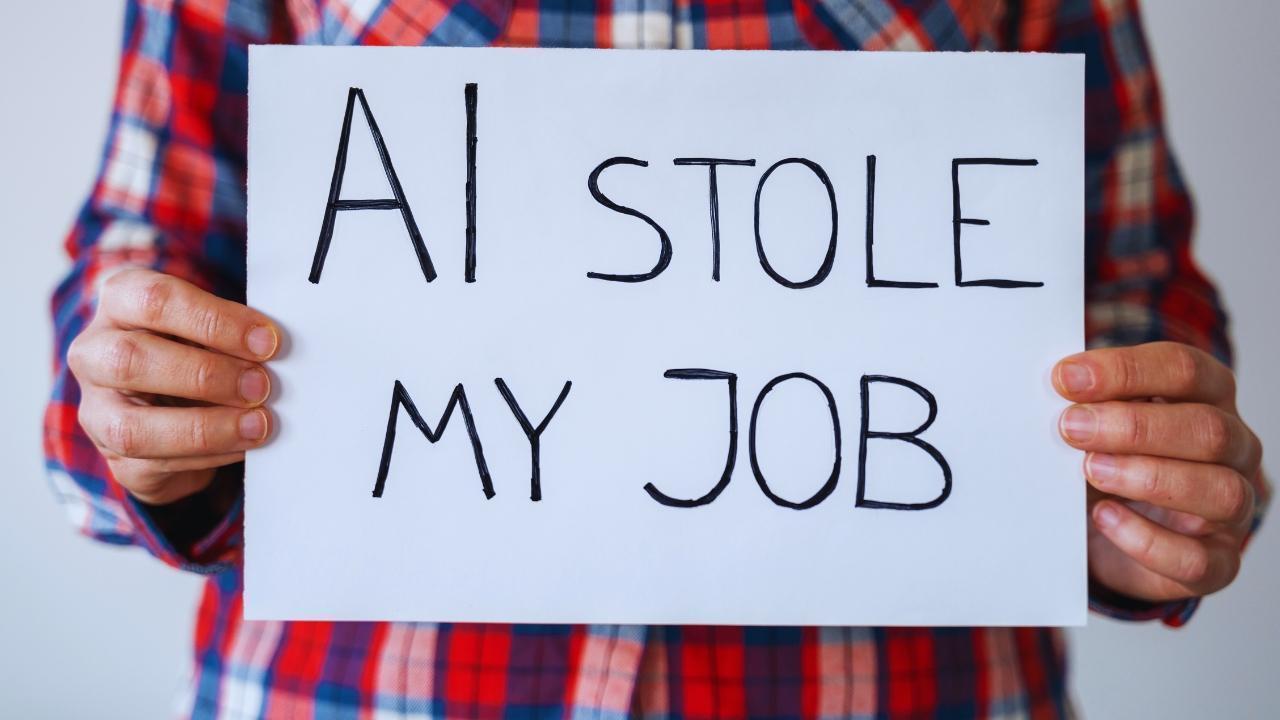You have not yet added any article to your bookmarks!

Join 10k+ people to get notified about new posts, news and tips.
Do not worry we don't spam!

Post by : Anis Farhan
We are standing at the cusp of one of the biggest shifts in employment history. The acceleration of artificial intelligence—driven by advances in machine learning, generative models, and automation—is not only transforming how businesses operate but is also reshaping the very structure of the global workforce. As more organizations embrace AI to enhance productivity, optimize processes, and deliver smarter services, they’re also rethinking the human roles behind those processes.
The consequences are dual-edged: while certain jobs are disappearing or being redefined, entirely new categories of employment are emerging. And in many cases, these new roles require skills that weren’t even on the radar a decade ago. So, what’s being phased out, and what’s suddenly in high demand?
AI’s ability to mimic cognitive tasks—especially those that involve pattern recognition, prediction, and data processing—is putting several types of jobs at risk. These are often roles that are repetitive, rules-based, or reliant on structured inputs.
Administrative Support and Clerical Work
From scheduling to data entry, AI-enabled tools like virtual assistants and document automation software are replacing many clerical roles. Companies are using AI to sort emails, transcribe meetings, and even handle basic customer correspondence—tasks that once required entire teams.
Customer Service Agents
Chatbots and voice AI systems have matured dramatically in recent years. Many companies now deploy intelligent assistants to handle first-tier support across channels, reducing the need for large human-staffed customer service departments.
Retail and Cashier Jobs
Self-checkout systems, automated kiosks, and even AI-driven inventory management systems are streamlining front-line retail work. In some countries, cashierless stores powered by computer vision (like Amazon Go) are already functioning without human cashiers.
Data Entry and Bookkeeping
These are classic examples of roles being automated at scale. AI-powered tools can now reconcile books, extract data from receipts, and generate financial reports, all without human intervention.
Basic Content Creation
Though AI writing tools still lack the nuance of human tone, they are already handling low-level content creation like product descriptions, FAQs, and metadata. This reduces the need for entry-level writers and editors in certain sectors.
Despite these eliminations, the AI era is opening a vast range of new career opportunities—especially for those willing to upskill. The roles now in high demand tend to fall into one of three categories: technical development, strategic implementation, or ethical governance.
AI and Machine Learning Engineers
Unsurprisingly, the people building the AI systems are in very high demand. These engineers design, train, and refine algorithms, and they are central to an organization’s digital transformation efforts. Companies across all industries are scrambling to hire ML experts to stay competitive.
Prompt Engineers and AI Trainers
A newer role that barely existed before 2023, prompt engineers are specialists in designing the inputs that guide generative AI systems. They make AI models produce better results through smarter queries. Similarly, AI trainers help teach models to respond accurately through human feedback.
Data Scientists and Analysts
As AI systems rely on vast amounts of data, professionals who can clean, structure, and interpret data have become indispensable. Analysts are needed to translate AI-generated insights into real-world business strategies.
Cybersecurity Experts
AI isn’t just creating new tools—it’s also enabling new forms of cybercrime. This is driving an urgent demand for cybersecurity specialists who can defend against AI-driven threats like deepfakes, phishing automation, and intelligent malware.
Ethics Officers and AI Governance Leaders
Concerns about AI bias, surveillance, misinformation, and autonomy are growing. Companies, especially global ones, are hiring professionals to ensure their AI strategies remain compliant with evolving legal and ethical standards. Roles like AI policy analysts, governance officers, and fairness auditors are booming.
Human-AI Interaction Designers
These professionals work at the intersection of user experience and AI behavior. Their job is to make AI systems more intuitive, human-like, and emotionally intelligent—an area critical to consumer adoption and trust.
Digital Transformation Consultants
As businesses implement AI, they need guidance on how to do it without disrupting operations. Consultants who specialize in helping companies integrate AI across workflows are seeing a surge in demand.
AI is no longer confined to the tech sector. From healthcare to hospitality, industries are building out dedicated AI departments and creating new hybrid roles.
Healthcare
AI is revolutionizing diagnostics, imaging, patient engagement, and even drug discovery. Roles like medical data annotators, AI imaging analysts, and telehealth coordinators are growing rapidly.
Finance
Banks and fintech companies are applying AI to fraud detection, algorithmic trading, and customer onboarding. Quantitative analysts, AI auditors, and digital financial advisors are in growing demand.
Media and Entertainment
From automated video editing to voice cloning and personalization engines, AI is transforming content production. Studios are hiring AI tools specialists and ethics consultants to navigate this new space.
Education
EdTech firms are using AI to customize learning paths and create smart classrooms. Instructional designers with AI expertise and digital learning strategists are increasingly important.
Manufacturing and Logistics
Predictive maintenance, robotics, and intelligent supply chains are standard now. AI integration specialists and industrial data scientists are among the fastest-growing job categories in these sectors.
Even if your job is not in direct danger, upskilling is essential. The AI revolution rewards those who can adapt and rethink their roles alongside technology. The following skills are proving most resilient—and valuable:
Analytical thinking and complex problem-solving
Digital literacy and adaptability
Data fluency, including basic statistics and data visualization
AI collaboration and tool management (e.g., using AI for productivity)
Creativity and storytelling—skills still uniquely human
Ethical reasoning and socio-technical understanding
Soft skills, especially emotional intelligence, communication, and leadership, remain irreplaceable. In many hybrid human-AI roles, the human element becomes even more critical.
The impact of AI on jobs is not uniform. Routine-based roles, especially in industries where cost-cutting is prioritized, are most vulnerable. But the effect also varies across countries, with developing economies potentially facing higher displacement rates due to lower AI adoption costs.
For professionals in at-risk sectors, the key is reskilling. Governments, corporations, and institutions are investing in training programs that help workers transition into higher-value roles. This includes government subsidies, tech bootcamps, online certifications, and corporate learning platforms.
AI is also creating new entrepreneurship opportunities. Freelancers and creators who embrace AI as a co-pilot—not a competitor—are finding ways to enhance output, reduce costs, and expand reach.
Educational institutions are beginning to catch up. Universities are launching AI-centric degrees, and schools are embedding coding and data literacy into their curricula. But change is slow, and industry-academia collaboration is essential.
On the policy front, governments face a dilemma. They must regulate AI to prevent mass displacement while also encouraging innovation. This balance is tough but crucial. Countries that invest in AI training infrastructure, social safety nets, and fair employment transitions will likely fare better in the coming decade.
While fears of an AI job apocalypse are real, the more likely future is not one of widespread joblessness—but of job evolution. Human workers won’t vanish; they’ll work differently, often alongside machines.
AI will become a tool as common as email or Excel—a silent assistant embedded into every task, making jobs faster, smoother, and in many cases, more creative. The most successful professionals will be those who learn to leverage AI without losing their uniquely human edge.
The AI hiring boom is here. The question is: are you ready to evolve with it?
The information in this article is intended for editorial purposes and general insight. Readers are encouraged to seek professional career advice before making any employment or educational decisions. Newsible Asia is not responsible for any consequences resulting from career or business decisions made based on this article.










Sumo Rocked by New Bullying Scandal as Terunofuji Admits Abuse
Retired grand champion turned stablemaster reports himself to authorities for violent conduct toward

Son of Oil Tycoon Riza Chalid Sentenced to 15 Years in $17 Billion Corruption Scandal
Jakarta Corruption Court convicts Muhammad Kerry Adrianto Riza in high‑profile Pertamina graft case

Marina Bay to Celebrate Disney Adventure With Fireworks & Fun
UOB Marina Bay Sands & Singapore Tourism Board join Disney Cruise Line for a 2-month nautical celebr

Rashmika Mandanna and Vijay Deverakonda Tie the Knot in Grand Udaipur Wedding
The beloved actors celebrated their Telugu and Kodava heritage with traditional ceremonies at ITC Me

Raja Ampat Welcomes Back Endangered Zebra Sharks
Scientific collaboration and community education drive rare species repopulation in the Coral Triang

Tomorrowland Thailand Set for Full‑Scale Asian Debut in December 2026
Thailand to host world‑renowned electronic music festival in Pattaya, expected to draw tens of thous